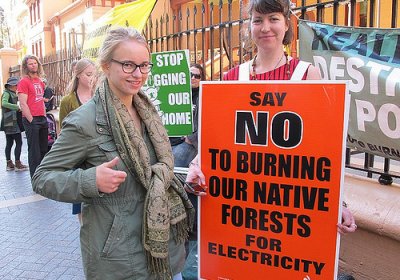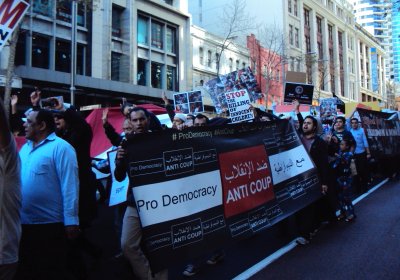Hundreds of people campaigning against coal seam gas (CSG) mining delivered a petition, signed by more than 13,000 people, to NSW Premier Barry O'Farrell on August 21.
The NSW-wide petition, initiated by Stop CSG Illawarra, calls on the government to: "Ban all coal seam gas prospecting and mining in New South Wales drinking water catchment areas".
Stop CSG Illawarra spokesperson Jess Moore said at the rally: "We want the land in NSW that supplies our drinking water protected.
Australia
About 500 people rallied at City Square against coal seam gas (CSG) extraction in Seaspray on August 17. Many at the rally were cattle farmers in the Gippsland area.
Protesters expressed concern that CSG mining would destroy farmland, contaminate water, threaten the health of their rural community and create seismic activity.
Some farmers expressed their dilemma over whether to stay and fight the CSG companies, or sell their properties before CSG becomes established in the area.
The Socialist Alliance Senate candidates for New South Wales, Jim McIlroy and Reg Dare, spoke to Green Left Weekly about two of the party’s key platforms in this year’s federal election.
McIlroy, 67, is a retired public servant and 15-year workplace delegate for the Community and Public Sector Union. He radicalised during the 1960s anti-Vietnam War campaign, and has been involved in the socialist movement for more than 40 years.
The WikiLeaks Party has come under fire for its Western Australia and New South Wales preference allocations for the federal elections, which put right-wing and racist groups ahead of Greens and socialist candidates.
WikiLeaks Party senate candidate for Western Australia, Gerry Georgatos, has defended a decision to preference two National Party candidates ahead of Greens Senator Scott Ludlam. Of all Australian parliamentarians, Ludlam has been the most outspoken in defence of WikiLeaks and Julian Assange.
About 30 people rallied outside NSW state parliament on August 15 to protest plans by the Liberal state government to change regulations to allow native forest biomass to be burned to generate electricity.
Environment groups are worried the change will lead to wholesale destruction of native forests and woodlands to feed the power generators.
Protests were also held in Bega and Bellingen on the same day. The rallies were sponsored by an alliance of environment conservation organisations.
More than 500 people, mainly from the Egyptian community, rallied at Sydney's Town Hall Square and marched through city streets to the Egyptian consulate on August 18, in opposition to the military crackdown over recent days in Egypt.
Speakers condemned the massacres committed by the military regime in Egypt against peaceful supporters of ousted president Mohamed Morsi.
Chants during the march included, "Free, free Egypt!", "Egypt will soon be free!", and "General al-Sisi, assassin!'
A fire ripped through Nauru's main hospital on August 14, destroying the pharmacy, medical stores and x-ray facilities.
Joanna Olsson from the Nauru government's information office told the ABC that the fire ruined a quarter of the building and could entail a “medical emergency” for Nauru.
The cause was believed to be electrical. Like many services on the island, Nauru's hospital is rundown and relies on Australian aid for maintenance and repair.
About 260 people gathered at a mass meeting in Tecoma on August 11 and vowed to continue to fight against a McDonald’s Restaurant in their town.
Demolition of the site began on August 8 but the meeting reaffirmed their determination to maintain a protest on the site.
Support for the protest continues to grow. The Victorian branch of the Australian Service Union released a statement on August 10.
Locked-out Yallourn power station workers were joined by hundreds of people at a rally outside the offices of their employer, Energy Australia, in Melbourne on August 16.
The company, a subsidiary of the Hong Kong-based China Light and Power, locked out all 75 shift operators, members of the Construction Forestry Mining Energy Union (CFMEU), on June 21.
The workers had been limiting power output as part of a campaign of protected industrial action in pursuit of a new enterprise agreement.
Liberal leader Tony Abbott's statement that marriage equality was a passing “fashion of the moment,” has galvanised anger in the lead up to nation-wide marriage equality rallies.
It follows Prime Minister Kevin Rudd’s promise to introduce a bill for marriage equality within 100 days of being re-elected.
During the August 11 debate between Rudd and Abbott, instead of committing Labor to passing the bill, Rudd said his party would have a conscience vote, and called on the Liberal Party to do the same.
This statement was released by the Socialist Alliance on August 16.
***
Kevin Rudd says he is now in favour of equal marriage rights, but Labor’s policy allows its politicians a "conscience vote". This is simply unacceptable, and lets homophobic MPs off the hook.
Why does Labor have a "conscience vote" on equal marriage? It doesn't have a conscience vote on other issues, such as sending asylum seekers to PNG or cutting sole-parent pensions — even though Labor's policies on these issues violate the conscience of any decent human being.
The Socialist Alliance is using the federal election to popularise the idea that we need bring mines, banks and power companies into democratic public ownership. Here are five reasons why this is a good idea.
1. Wealth distribution
The richest 20% in Australia own more than the rest combined. Mining company profits rose 540% between 2000 and 2009, while the share they paid as tax or royalties dropped from 40% to 14%.
- Previous page
- Page 644
- Next page










